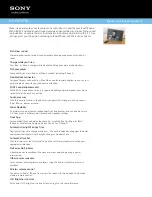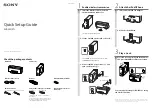
ENGLISH
Get
ting Star
ted
Connections
Pla
ybac
k
Remot
e Contr
ol
Inf
or
mation
Tr
oubleshooting
Specifications
Multi-Zone
Set
tings
• Select the terminal to use and connect the device.
• For video connections, see “Converting input video signals for output
(Video Conversion Function)” (
v
page 9).
*/
7*%&0
$0.10/&/57*%&0
:
1
#
1
3
7*%&0
*/
"6%*0
015*$"-
065
Monitor (TV)
The component video connectors may be indicated differently on your
monitor. For details, see the monitor’s operating instructions.
Monitor (TV)
For instructions on HDMI connections, see “Connecting Devices
Equipped with HDMI terminals” on page 12.
Connecting devices
NOTE
• If the menu “HDMI Audio Out” setting (
v
page 28) is set to “AMP”,
the sound may be interrupted when the monitor’s power is turned
off.
• The audio signal from the HDMI output terminal (sampling
frequency, number of channels, etc.) may be limited by the HDMI
audio specifications of the connected device regarding permissible
inputs.
• Use a cable on which the HDMI logo is indicated (a certified HDMI
product) for connection to the HDMI connector. Normal playback
may not be possible when using a cable other than one on which the
HDMI logo is indicated (a non-HDMI-certified product).
• When the AVR-790 is connected to other devices with HDMI cables,
also connect the AVR-790 and TV using an HDMI cable.
• When a device supporting Deep Color signal transfer is connected,
use a cable compatible with HDMI ver.1.3a.
• Video signals are not output if the input video signals do not match
the monitor’s resolution. In this case, switch the Blu-ray Disc player /
DVD player’s resolution to a resolution with which the monitor is
compatible.
The AVR-790 allows connection of inputs from up to 4 HDMI
devices and output to 1 TV.
NOTE
• No sound is output when connected to a device equipped with a
DVI-D terminal. Also make the audio connections.
• Signals cannot be output to DVI-D devices that do not support
HDCP.
• Depending on the combination of devices, the video signals may not
be output.
n
Connecting to a device equipped with a DVI-D
terminal
When an HDMI/DVI conversion cable (sold separately) is used, the
HDMI video signals are converted to DVI signals, allowing connection
to a device equipped with a DVI-D terminal.
NOTE
The audio signals output from the HDMI connectors are only the
HDMI input signals.
065
)%.*
065
)%.*
065
)%.*
065
)%.*
*/
)%.*
DVD
Player
Blu-ray
Disc Player
SAT/CABLE
Tuner
Digital Video
Recorder
Monitor
(TV)
Connections
n
Settings related to HDMI connections
Set as necessary. For details, see the respective reference pages.
Input terminal assignment (
v
page 33)
Set this when changing the input sources of the different terminals.
HDMI Setup (
v
page 28)
Make these settings related to HDMI input/output signals.
• Auto Lip Sync
• HDMI Audio Out
• HDMI Control
• Standby Source
• Power Off Control
Connecting Devices not
Equipped with HDMI terminals
Connections
















































